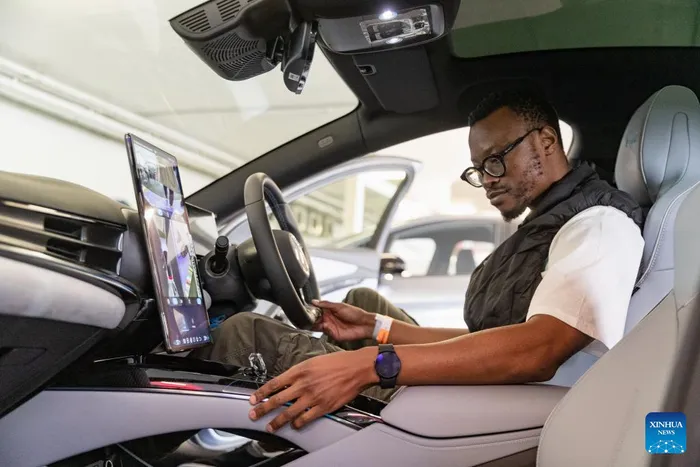
A visitor tries an electric vehicle of BYD from China during the Festival of Motoring in Johannesburg, South Africa, Aug. 30, 2024. This event is held here from Aug. 30 to Sept. 1.
Image: Xinhua
By the end of 2024, South Africa had 3,543 registered passenger EVs, worth about R2.8 billion. Most of these cars fall in the luxury and high-end market, think Tesla imports, BMW i-series, Porsche Taycan, and the Jaguar I-Pace. Current adoption in this premium bracket sits at around 1.9% of new car sales.
The real growth opportunity lies in mid-range EVs, which are expected to enter the market in larger numbers between 2026 and 2030. If mid-priced EVs catch on, an extra 21,913 EVs could be on South African roads by 2030, adding another R13.9 billion to the market.
Public Transport Slowly Plugging In
South Africa has roughly 66,000 buses, midibuses, and bus-trains in circulation. By 2024, just 156 of these were electric, with a combined value of R1.1 billion.
The numbers may look small, but operators like Golden Arrow in Cape Town and others have already begun pilot programs. With new rollouts planned, sales of electric buses are forecast to grow by 420 units between 2025 and 2030, pushing the total to about 576 buses by the end of the decade.
For context, countries like Kenya and Egypt are moving faster on electric public transport, showing that Africa is waking up to EV buses as a way to cut fuel imports and reduce emissions.
Trucks and Vans Enter the Market
On the commercial side, South Africa had only 172 electric trucks and vans on the road by the end of 2024, worth about R250 million. But things are expected to change. By 2030, that number could rise to 1,000 commercial EVs, with a total market value of around R1.43 billion.
Key drivers include rising petrol and diesel costs, decarbonisation pressures from trade partners, government incentives, and better charging infrastructure. Logistics giants are watching closely, especially as international supply chains move toward carbon-neutral standards.
The E-Bike and Three-Wheeler Debate
EV growth isn’t just about cars, buses, and trucks – e-bikes and e-cargo bikes are also making an impact, especially in townships and for last-mile delivery. In Soweto, e-cargo bikes are helping small shops get stock faster and cheaper.
But regulation is becoming a challenge. Under the new National Land Transport Amendment Bill, any e-bike that goes faster than 25 km/h is legally considered a motor vehicle. That means it can’t use bike lanes, and the rider would need a license. Similarly, electric three-wheelers are only allowed on urban roads, not highways, limiting their usefulness for long-distance deliveries.
This means e-commerce companies will likely need to build smaller, more localised distribution hubs if they want to make full use of these vehicles.
South Africa’s EV market is still tiny compared to global leaders like China, Europe, and the US. By 2030, the country will still have fewer than 30,000 passenger EVs, while Europe is targeting tens of millions in the same period.
But change is coming. The combination of:
means that adoption will likely speed up after 2030.
Across Africa, the story is uneven, Kenya and Rwanda are leading with policies supporting electric two- and three-wheelers, while Egypt and Morocco are building local EV assembly hubs. If South Africa wants to stay competitive, especially as the EU begins enforcing carbon-border taxes, it will need to accelerate investment in local EV manufacturing, charging networks, and supportive policies.
South Africa’s EV market is starting slow, but momentum is building. By 2030, the country could see over R17 billion worth of EVs across passenger cars, buses, and trucks. While that’s small compared to global players, Africa as a whole is moving towards electrification – and South Africa has the chance to lead if it can overcome regulatory, cost, and infrastructure challenges.
Written By:
*Dr Iqbal Survé
Past chairman of the BRICS Business Council and co-chairman of the BRICS Media Forum and the BRNN
*Chloe Maluleke
Associate at BRICS+ Consulting Group
Russian & Middle Eastern Specialist
**The Views expressed do not necessarily reflect the views of Independent Media or IOL.
** MORE ARTICLES ON OUR WEBSITE https://bricscg.com/
** Follow https://x.com/brics_daily on X/Twitter for daily BRICS+ updates
Related Topics: